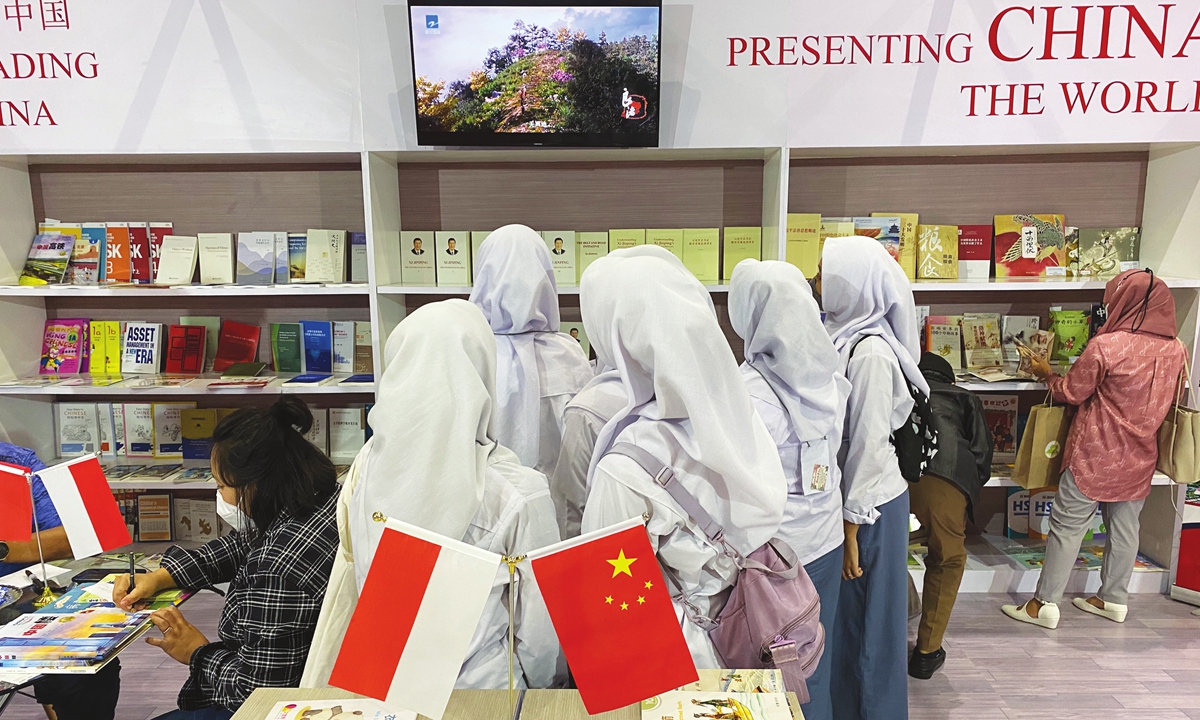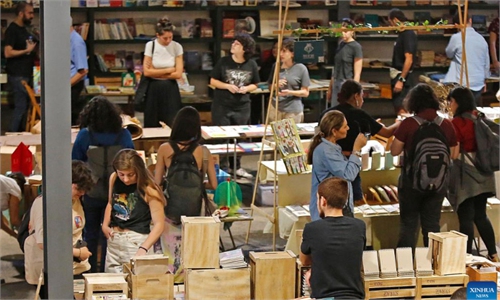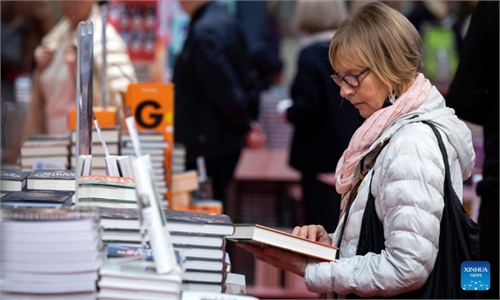ARTS / BOOKS
China-Indonesia translation project promotes mutual understanding
Growing cultural ties

Indonesians explore the China booth at the Indonesia International Book Fair in Jakarta on November 12, 2022.Photo: Courtesy of Yayasan Pustaka Obor Indonesia
A group of young Indonesians gather in front of a large LED screen at the China booth at the ongoing Indonesia International Book Fair (IIBF) in Jakarta to watch a promotion video for the Liangzhu Culture, one of China's earliest civilization sites. They are astonished to learn that the site shows that the faraway country's long civilization stretches back to more than 5,000 years ago.
This is just the first new fact among the many they would go on to learn that day about the Liangzhu Culture thanks to collaboration between Chinese and Indonesian publishing houses.
Four books released in Indonesia at the book fair by China's Social Sciences Academic Press and Yayasan Pustaka Obor Indonesia - The Chinese Dream and the Chinese Road, Hope for a Populous Nation, 2050: China's Low-carbon Economic Transition, and On the Agricultural Transition of a Big Country - are the latest results of the two countries' cooperation in the field of literature translation.
"The translation project between China and Indonesia is a significant part of China's initiative to translate Asian classics from and into Chinese, which was put forward by Chinese President Xi Jinping at the Conference on Dialogue of Asian Civilizations in 2019," Xu Liping, director of the Center for Southeast Asian Studies at the Chinese Academy of Social Sciences, told the Global Times on Sunday.
In his keynote speech on May 15, 2019, Xi said that China is happy to launch initiatives with relevant countries to translate Asian classics and promote film and TV exchanges and cooperation in the region.
This will help people in Asia better understand and appreciate each other's cultures as well as building a platform for exchange and mutual learning, so that the best of Asian civilizations can be appreciated by more people around the world.
Platform for exchanges
As an important part of the Asian classics translation project, China-Indonesia cooperation has allowed more books narrating China's development and cultural achievements enter Indonesia, while also helping build a platform for the two peoples to learn from each other.
"Books are a bridge to connect human culture," Paulus Rudolf Yuniarto, a researcher from the Research Center for Area Studies, Indonesia National Research and Innovation, told the Global Times on Monday.
"The idea of translating Chinese and Indonesian classic works is an important channel for mutual understanding of the cultural differences between the two countries. Experts from China and Indonesia have high hopes and full confidence in the publishing cooperation between the two countries."
In Xu's eyes, the initiative aims to improve the popularity of classic books among people in different countries around the world, which is a significant part of strengthening social foundations and public support in countries taking part in the Belt and Road Initiative as the "influence of literature can penetrate deep into people's heart and get close to people's daily lives."
The upcoming Liangzhu Civilization Series, to be released in German, French and Italian as well as Indonesian, showcases the magnificent accomplishments of the Liangzhu Royal City in terms of natural environment, agriculture, handicraft industry, water conservancy engineering, jade carving and other areas, bringing foreign readers closer to the abundant cultural heritages in archaeological sites, museums and ancient books, according to the series' publisher Zhejiang University Press.
Key to communication
Indonesian sinologist Novi Basuki told the Global Times on Monday that from the perspective of political and economic cooperation, China and Indonesia have been doing a "great job in improving bilateral relations." However at the level of people-to-people exchanges, "prejudices and misunderstandings still exist for many reasons, including biased Western media reports and a lack of cultural communication."
To reduce bias between the two countries' societies, cultural and people-to-people exchanges, such as the literature translation project, appear to be "much more important than many other aspects, as this kind of exchange acts as the base for solid political and economic cooperation between China and Indonesia," Basuki added.
"Just as an old Chinese saying goes, 'If you don't listen to the elderly, you will suffer.' You must make good use of Chinese experience and avoid detours."
Translating classic literary works through mutual cooperation is an important part of people-to-people exchanges, especially including cultural exchanges, which is "a long-term process and can have profound influence, like a spring breeze or rain," added Xu.
The projects can also promote the implementation of the Global Development Initiative, inviting more countries to enjoy the benefits of cooperation and communication.
"The prospects for cooperation will increase, not only in book translation but also cooperation in social sciences and technology research," said Paulus Rudolf Yuniarto, who also attended the Global Development Initiative and the China-Indonesia Cooperation Prospects forum at the book fair on Saturday.
As the largest and third-largest developing countries in the world, China and Indonesia's people-to-people exchange mechanism has been the "first high-level exchange mechanism among BRI countries," said Xu.




